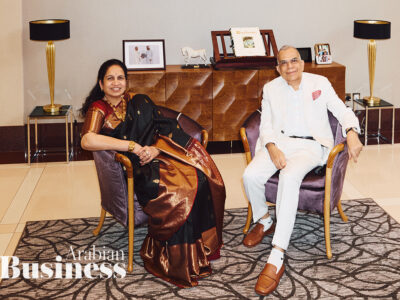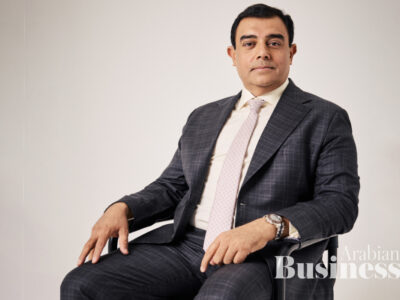As I sit across from Eugene Kaspersky, it’s hard to believe that this unassuming man with an infectious laugh once worked as an engineer in the Soviet Army. Now one of the preeminent experts in cybersecurity, Kaspersky took an unexpected path to become the CEO and driving force behind Kaspersky, one of the largest private cybersecurity companies in the world, leaving behind an unrivalled legacy, but it wasn’t always necessarily meant to be.
“Just after the collapse of the Iron Curtain, we had zero knowledge about the world abroad. When we started to build an international business, we made many mistakes,” he recalls.
Kaspersky first developed an interest in computer viruses as a hobby in the late 1980s and early 1990s while working for the Soviet Army after graduating with a degree in mathematical engineering and computer technology. As he collected and studied computer viruses during his free time, he realised his hobby was slowly turning into an opportunity.
“In 1991, I realised that since my hobby is turning into a business, little by little, because I saw that there’s some people, some companies they want to use my work,” he explains. But at the time, the Soviet regime prohibited people from running independent businesses. So, Kaspersky made the difficult decision to leave the security of a military career to work for a Russian IT company before venturing off on his own to set up a company based on his antivirus research.
As Kaspersky acknowledges, he and his co-founders were naive about building an international business. “We had zero knowledge in business, so we didn’t know what to do. We were engineers in Russia, unknown,” he says. “Under Communism, business was illegal. If you had your own private business, you could have ended up in jail. It was forbidden but there were private, illegal businesses, and from time to time, if they made too much money, there was a death penalty.”
“We didn’t have business schools at all in Russia – zero. We learned everything ourselves. We were just engineers.”
Trained in the technical skills prized under Communism but not the business acumen needed in a capitalist system, Kaspersky and his team learned through trial and error. They made mistakes, both lucky and unlucky. But they were determined to leverage Kaspersky’s antivirus engine – recognised as world-class even then – to build a successful company.
One smart early decision was to license Kaspersky’s powerful antivirus technology to competitors lacking robust security solutions.
This provided crucial revenue to reinvest in developing consumer products that would carry the Kaspersky name. By the late 1990s, Kaspersky was gaining traction in Russia but remained unknown in most of the world.
To change that, they took a big gamble in 1999 by exhibiting at an international IT conference in Germany called CeBIT. Kaspersky laughs as he recalls their tiny booth relegated to a corner near the bathrooms. “We had a very small booth close to the entrances of the toilet, but that worked in our favour because everyone would have to pass by.”

But the unmatched quality of their technology spoke for itself. Each year they returned to CeBIT with an expanded presence, slowly working towards the centre of the exhibition hall. This patient, persistent growth mirrored the steady expansion of their global customer base. As Kaspersky grew, Kaspersky leaned on his then-wife to lead international sales and manage partnerships, compensating for their collective lack of business experience.
He fondly recalls the guidance received from honest partners who became friends and taught them how the tech world operates beyond Russia’s borders. By the mid-2000s, Kaspersky had established itself as a leading antivirus company with offices around the world. Though initially resistant to naming the company after himself, Kaspersky acknowledges that his reputation as an antivirus expert played a key role during the fragile early period.
“We didn’t speak English. I used to carry two big dictionaries – Russian to English and English to Russian.”
Even in the early days, Kaspersky demonstrated vision by focusing relentlessly on superior technology instead of sales and marketing. When thinking back to the origins of the company, he stresses that “our goal was to make the best antivirus.” This philosophy continues to guide the company today as the cybersecurity landscape grows increasingly more complex.
Kaspersky worries that “the world is very fragile” due to dependence on vulnerable digital infrastructure never designed with security in mind. He sees cyber immunity through improved critical infrastructure standards as the necessary solution in what he calls “Security by Design.”
“In the mid-90s, there was no cybercrime. There were just hooligans, vandals,” he recalls. But by the late 90s, the threat landscape was rapidly evolving with the first email worms spreading malware like the infamous “I Love You” virus in 2000 – which he predicted ahead of time.
“There was no cybercrime back then, except in a few professional cases, because there was no money on the internet. It was just kids creating computer viruses and the worst thing they could do was delete information or freeze computers.”
After more than three decades on the front lines, Kaspersky has earned respect as both a pioneer and a visionary thinker in cybersecurity. But he has maintained the curiosity of that young Soviet army engineer staying up late to study computer viruses. This drive to understand the evolving technological landscape keeps propelling Kaspersky forward. While competitors come and go, Kaspersky’s commitment to “developing visibly better technologies and products” remains a constant.

The ‘economy’ of cyber criminals is constantly evolving
Kaspersky is proud of the role the company plays in helping law enforcement investigate cybercrime, leading to many arrests globally. “We cooperate with cyber police forces to help them investigate cases and actually, there’s quite a lot of criminals who were arrested with our help – I don’t know how many, but I wouldn’t be surprised if it was about 1,000.”
When looking at cybercrime, the most spoken language is Chinese, the cybersecurity veteran reveals, followed by Russian, Spanish and Portuguese, and then Turkish – among many others. He notes that the “most professional” gangs speak Russian, while the “most annoying” speak Chinese – referring to their persistent style of hacking.
Kaspersky details how different regions seem to specialise in certain types of cybercrime, with Latin America mainly carrying out financial fraud through “banking Trojans” and Chinese-speaking criminals using botnets to steal and trade information. While Russian gangs, on the other hand, are known for ransomware.
Cyber criminals are now operating like a global network, or an “industry” of sorts, learning from each other and playing different roles in carrying out attacks.
“It’s like an economy but they don’t pay taxes. They work remotely, and in most cases they don’t know each other so they communicate only by internet. They work in groups where the first group hacks the victim or enterprise, the second group are financial criminals looking for information so they try to hack their financial department. If they fail to do so, they bring in the ransom group which encrypts everything and gives access to negotiators. This is a problem because they are becoming more and more professional.”

Still full of energy and ideas at 58 years old, Kaspersky doesn’t plan on stepping back from the company he built any time soon. “Maybe in 10 years,” he says with a laugh. But by surrounding himself with a team of trusted experts, he’s confident Kaspersky is positioned for sustained success.
As cyber threats grow more severe, the world needs the veteran perspective and technical acumen that only comes from experiencing firsthand the arc of cyber history. Thankfully, Eugene Kaspersky still eagerly comes to work each day, vowing to keep the world safe. “Don’t worry, I’m here,” he says.









